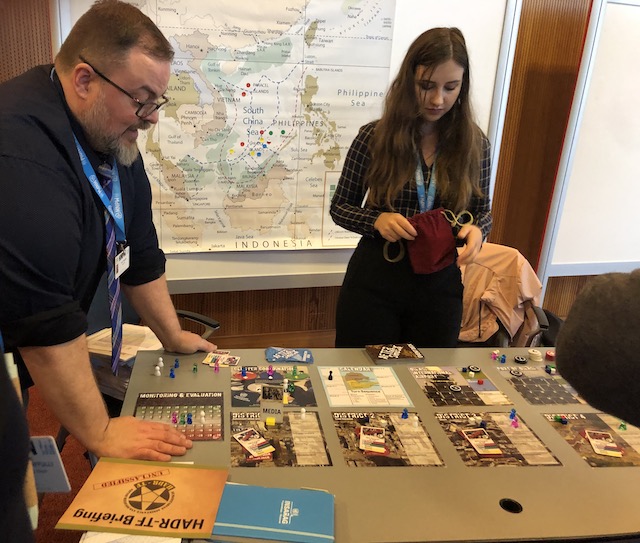GENEVA — Over 2,000 experts from around the world, NGOs, governments, regional organizations, private sector and the UN, met up here to talk preparedness and response.
We were there, too — lathering up on hand sanitizer and stomping with excitement over our mention in the “Words into Action” guidelines — here are a few standouts from the week.
Simulation, for real
The conference is free and open to anyone, but while there is no expense or credential barrier, newcomers fight through acronyms and that pervasive feeling that everyone knows each other already. Cutting through the familiaritis were some outstanding practical sessions.
This may be the coolest session so far at #HNPW2020: an interactive drought simulation for Anticipationland pic.twitter.com/BQN8gTHfyM
— nicole martinelli (@nmar) February 5, 2020
In my favorite one, participants paired up to decide the fate of drought-plagued Anticipationland. Players acted as an NGO with a $10,000 budget and were prompted to make decisions on how to spend that money at different points in the crisis. Run by Start Network, it was a good example of how to show what you can do by demo. The simulation was streamlined with the responses tallied in real time with Mentimeter. The answers sparked an interesting final discussion – especially around the controversial area of cash handouts, which were not an option as the simulation was designed.
These practical sessions – slotted in between network meeting, technical meetings, briefing sessions and working groups – were harder to suss out in Geneva than climate change deniers. The printed program offers up just the titles of the sessions. The mobile version with detailed description was too janky to consult with any regularity. The result: a few too many sounded captivating but were essentially 30-minute sales pitches. These also liberally popped up in the Speaker’s Corner, which offered 5-7 minute standups. Even five minutes upselling training software and inviting participants to check out the booth is too long.

Speaking of simulations, game maker Imaginetic was a standout booth for the event. Something like two hours disappeared playing “Aftershock,” billed as a humanitarian crisis game. You cooperate (natch) with the other players (NGOs, military, government) in a scenario modeled after events following Haiti’s devastating 2010 temblor. Somehow we managed to score a top number of negative points, despite playing with experienced UN and NGO professionals. That it was still somehow fun speaks to the strength of the game.
Schmoozing in the time of Coronavirus
In addition to reminding participants to come anyway in a pre-event email, the organizers stated that with we’d all get through it with a good hand wash and no masks.

There were posters keeping the hand wash ethos front and center, though better expressed by these vintage posters on show at the nearby International Red Cross and Red Crescent Museum. The nice thing about it: my habit of energetically waving when unsure of hand shaking or going in for a cheek peck was less awkward than usual.
Wait for it
There was an impressive number of sessions about preparedness, which can often get squeezed out at events like this. There are essentially two disaster camps: prep and relief. Often they are considered at odds for money, time, energy. Climate change means that more places confront more frequent lowercase “d” disasters: heatwaves, wildfires, planned power outages, not just the once-in-a-generation Disasters (major earthquakes, floods.) It’s a balancing act, as one session titled “A Stitch in Time,” noted about “making choices between funding for humanitarian needs and funding for needs that have not yet materialized based on early warning/risk monitoring.” And it’s a good thing we’re all talking more about it.
All in all, we took a lot of fresh ideas and insight away at the end of the week. Also, chocolate.
